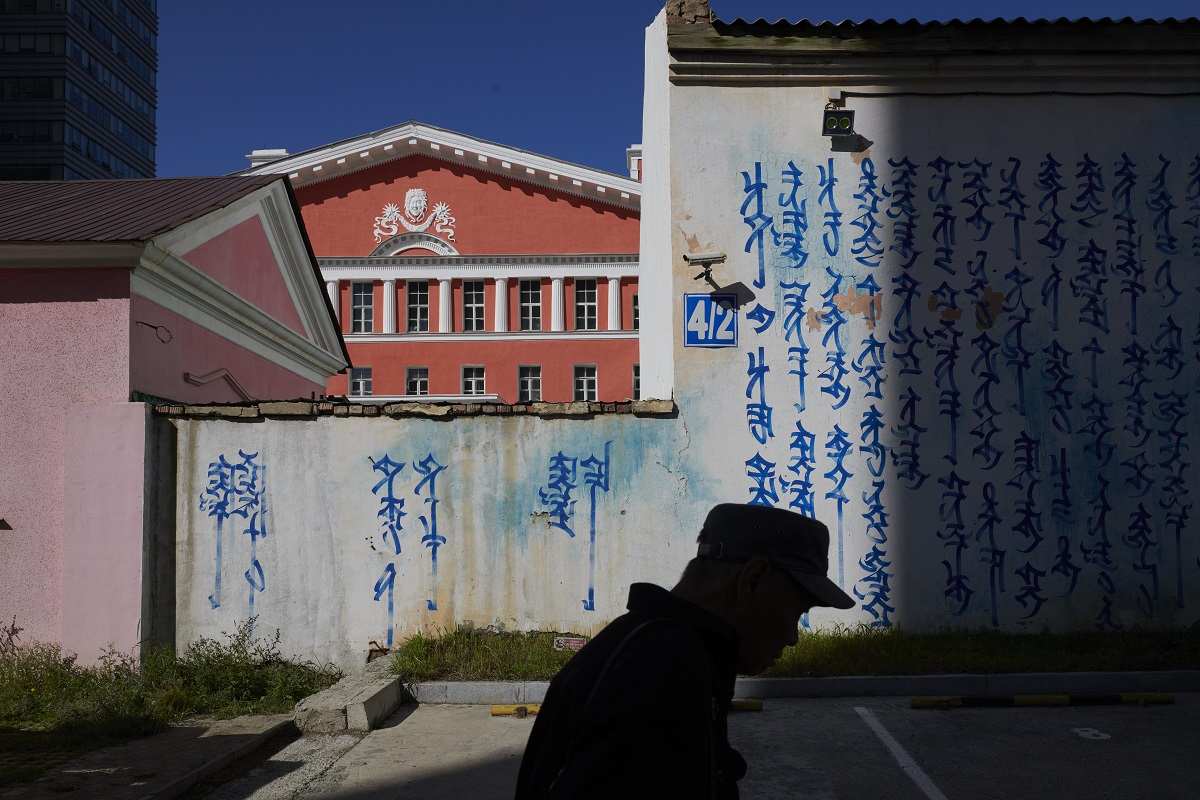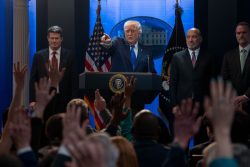
Dulguun Bazarkhairan, a teacher from Mongolia, with Munkhtsatsral Bayanmunkh, 12, during a calligraphy class in Ulaanbaatar. Beijing is watching the cultural evolution warily.
13:07 JST, December 11, 2023
ULAANBAATAR, Mongolia – All she wanted was for her only child to go to school in her native tongue.
In 2020, the ethnically Mongolian teacher living in the northern Chinese region of Inner Mongolia joined protests against a ban on most Mongolian-language education. Police cracked down hard. She was fired, hauled in for questioning and pushed into exile.
Three years later, her daughter is attending kindergarten here in Ulaanbaatar, where she can learn Mongolian and have pride in her heritage. But the former teacher fears that the Chinese security state could drag them back any day now.
China under Xi Jinping, its most powerful leader in decades, has progressively clamped down on ethnic minorities living on the country’s periphery: Tibetans, Uyghurs, Kazakhs and Mongols have all been targeted as part of Xi’s broader effort to crush dissent and force assimilation into the Han Chinese majority.
This effort has increasingly spread beyond China’s borders. To combat international criticism and silence diaspora communities, Beijing has used economic leverage and political pressure to enlist other countries to support Xi’s quest for absolute control.
Governments on China’s doorstep face a stark choice about how far to go along with Beijing’s global agenda. Shared culture and language make neighboring countries a natural destination for people fleeing China’s borderlands, but these places are also the focus of efforts to defend against perceived foreign threats.
Beijing views exiles like the small but growing number of China-born Mongolians living in Ulaanbaatar as dangerous pockets of overseas resistance who could incite protest at home. Six people who spoke to The Washington Post all reported varying degrees of Chinese police harassment and intimidation through phone calls, messages and pressure on their families in China.
An emerging network of Mongolian activists and politicians want to protect these people, despite concern from Mongolian officials about angering China, the country’s largest trading partner. As a young democracy concerned for human rights, they argue, the country should be a haven for persecuted Mongols everywhere.
That tussle over influence and values is already underway in Mongolia, a former Soviet satellite state once known as “Outer Mongolia” where, after the fall of Communism in 1990, leaders built a multiparty democracy and reoriented the national identity around Mongol heritage and historical figures like Genghis Khan. The traditional Mongolian script abandoned in the Soviet era will be reinstated as an official language in 2025.
At the same time, the leaders of Mongolia, landlocked and dependent on China and Russia for trade and energy, have sought closer ties with the United States and its allies to shake off those overbearing neighbors.
Beijing has been watching this cultural evolution warily.
The Chinese Communist Party has governed the southern part of the Mongolian homeland – “Inner Mongolia” – since 1947 and is deeply suspicious of resurgent Mongol nationalism. It fears stronger ties of blood and language across the border will undermine assimilation and control.
Some Mongolian activists fear that the Chinese security state could use cross-border policing ties to target critics of China on Mongolian soil. They say that ethnically Mongolian Chinese citizens seeking refuge over the border – activists estimate there could be hundreds – have little to no protection from Chinese police harassment.
The 2020 protests in Inner Mongolia were a “wake-up call” that China wants to “eliminate the great desire and tradition of Mongols to learn their own culture and language,” former Mongolian president Tsakhia Elbegdorj told The Post. “It’s a very dangerous policy.”
China’s Ministry of Foreign Affairs and Ministry of Public Security did not respond to requests for comment about Chinese security interests in Mongolia.
Free to speak Mongolian – but fearful of police
In a cafe on the ground-floor of a trendy apartment complex in southern Ulaanbaatar, where the snarl of traffic and dust fades into tree-covered mountains, the teacher grew pensive when talking about her struggle to stay in the country.
“Life has been very difficult,” she said through tears, speaking on the condition of anonymity to avoid reprisals from Chinese authorities. “Under Chinese rule, we lost our ancestral land and now they are taking away everything. Mongols in China will be Chinese within generations,” she said, suggesting they will be stripped of their identity.
China’s border may be nearly 900 miles away, but she is worried Chinese police could soon launch a formal investigation against her, which, under bilateral agreements, could easily result in her being detained and extradited.
Already in 2020, Chinese police seized on her social media posts as evidence of collusion with “hostile foreign forces” and interrogated her about a Mongolian activist, Munkhbayar Chuluundorj, she had barely heard of. Last year, the activist was jailed by Mongolian authorities for a decade on espionage charges. His family alleges the arrest was made to curry favor with Beijing.
More recently, the teacher said her fears intensified after she heard about an ethnic Mongol Chinese citizen, a dissident writer in his 80s, who was sent back to China. His case is at least the fifth instance of a Chinese passport holder being returned involuntarily from Mongolia since 2009, according to Safeguard Defenders, a human rights organization. In most cases, Mongolian authorities detain people and hand them over to China.
These events have made the teacher question whether she is really safe here. But she is determined to stay for her daughter. “If she can’t speak Mongolian, how can she say she is Mongol?” she asked.
A Mongolian jailed for working ‘against China’
The revolutionary statues and imposing colonnaded architecture of Sukhbaatar Square speak to Mongolia and China’s shared Communist history. But unlike Beijing’s heavily policed Tiananmen Square, where calls for democratic reform were brutally crushed in 1989, this expanse in central Ulaanbaatar remains the go-to place for a protest, just as it was in 1990 as the Soviet Union unraveled.
For decades, Munkhbayar, the activist the teacher was questioned about, was a familiar face among the crowds protesting issues such as corruption, pollution and inflation. More often than not, the activist would energetically criticize his country’s close relationship with China.
Then last July, the activist was detained and then sentenced to a decade in jail for “collaborating with a foreign intelligence agency.”
The case, which activists consider the first incident of a Mongolian critic of China being targeted, has become a rallying point for Mongolians who fear China’s growing influence. A famous Mongolian poet, Tsoodolyn Khulan, was jailed for eight years on similar charges in July.
She had criticized the selection of an 8-year-old boy as the reincarnated head of Tibetan Buddhism in Mongolia. China has watched that process closely as it attempts to weaken influence of the Dalai Lama, Tibet’s spiritual leader. Beijing considers him a “separatist.”
In Munkhbayar’s trial, prosecutors argued that Munkhbayar was guilty of espionage because he attended a meeting of activists organized by an Indian diplomat to discuss the crackdown in Inner Mongolia. The convener was an intelligence agent, they claimed, and by speaking to him, Munkhbayar had “worked against China.”
“They used that phrase ‘worked against China’ more than 10 times,” his brother, Munkh-Erdene Chuluundorj, said. How could unwittingly speaking to a foreign agent – about a foreign country – count as espionage? The only possible explanation, he said, is that the charges are politically motivated.
Mongolian authorities and the Indian embassy in Ulaanbaatar declined to comment on Munkhbayar’s case, the details of which are classified.
Munkhbayar’s firebrand advocacy made him an outlier, but he is far from alone in advocating that Ulaanbaatar should do more to defend Mongols in China.
After writing a public letter to Xi criticizing China’s Mongolian-language restrictions in 2020, Elbegdorj, Mongolia’s president from 2009 to 2017, launched the World Mongol Federation, a nonprofit group that speaks up for Mongols facing oppression across the world.
“Our main goal is to keep Mongolian culture and Mongolian identity safe. That should be our right, and we are defending that,” the 60-year-old statesman said.
But Beijing’s hair-trigger sensitivity to issues regarding ethnic minorities makes aiding Inner Mongolians – whether in China or in Mongolia – complicated. Behind closed doors, Beijing has warned the Mongolian government against providing official support, said two people familiar with the discussions, who spoke on the condition of anonymity to discuss a sensitive matter. The Mongolian administration declined to comment on Chinese pressure on Inner Mongolians in the country.
China’s coming showdown with Mongol solidarity
Underlying concern about Chinese influence are deeper fears that hard-line security policies under Xi amount to a wider assault on Mongolian culture and heritage.
Watching Mongols in China fight to protect their heritage sparked sympathy in Mongolia, because “people saw how hard they are trying to preserve their language,” said Zolzaya Nyamdori, executive director of the World Mongol Federation.
Others see a chance that China’s crackdown on Mongolian-language education, combined with its increasingly aggressive actions inside Mongolia, could backfire by spurring on criticism of China and support for Chinese Mongols in Ulaanbaatar.
Muumiangan Tengerleg walks through Ulaanbaatar looking like he just stepped out of the ancient past, when Mongols ruled from the Carpathian mountains of central Europe to the Sea of Japan. An ethnic Mongol from China who came here with a Chinese mining company 15 years ago, he now wears a navy blue deel tunic and traditional yuden hat.
Over a dinner of deep-fried mutton pockets, the 41-year-old said that if the Chinese government pushes too hard it could “bring together their enemies’ enemies,” meaning Mongols in China and Mongolia or elsewhere. “Then we would have a showdown,” he warned.
Among Mongol literati, there are few more potent symbols of their endangered heritage than the dying use of that vertical writing system. Many consider Mongolia’s adoption of Cyrillic in the 1940s a grievous error of Communism. At the time, Mao Zedong let Inner Mongolians keep the script, in part to distinguish them from kinfolk across the border. Now Mongolia is trying to undo that mistake.
Five minutes east of Sukhbaatar Square, a famous paean to the beauty of Mongolian language is painted in brilliant blue graffiti on a two-story whitewashed wall. The artist, who goes by the pseudonym Ochirone, said watching videos of protests in Inner Mongolia during the pandemic inspired him to teach himself the script and incorporate it into his work “as a reminder that language is the biggest part of our national identity.”
For some in Mongolia, China’s crackdown on the Mongolian language brings up unpleasant memories of the Soviet Union’s suppression of Mongolian intellectuals.
“The situation is desperate,” said Mongolian novelist Puvsan Purevdorj, who wants his government to offer visas to Inner Mongolians so they can come teach Mongolians how to write vertically.
“In the past, we achieved independence by standing, carefully balanced, between Russian and Chinese influence. But now that balance is being lost,” he said. “If Russia becomes China’s little sister, what happens to Mongolia then?”

A piece by artist Ochirone on a wall near the red Opera House in Ulaanbaatar, Mongolia. The script is a poem by Byambun Rinchen.
Top Articles in News Services
-

Survey Shows False Election Info Perceived as True
-

Hong Kong Ex-Publisher Jimmy Lai’s Sentence Raises International Outcry as China Defends It
-

Japan’s Nikkei Stock Average Touches 58,000 as Yen, Jgbs Rally on Election Fallout (UPDATE 1)
-

Japan’s Nikkei Stock Average Falls as US-Iran Tensions Unsettle Investors (UPDATE 1)
-

Trump Names Former Federal Reserve Governor Warsh as the Next Fed Chair, Replacing Powell
JN ACCESS RANKING
-

Producer Behind Pop Group XG Arrested for Cocaine Possession
-

Japan PM Takaichi’s Cabinet Resigns en Masse
-

Man Infected with Measles Reportedly Dined at Restaurant in Tokyo Station
-

Israeli Ambassador to Japan Speaks about Japan’s Role in the Reconstruction of Gaza
-

Videos Plagiarized, Reposted with False Subtitles Claiming ‘Ryukyu Belongs to China’; Anti-China False Information Also Posted in Japan

























